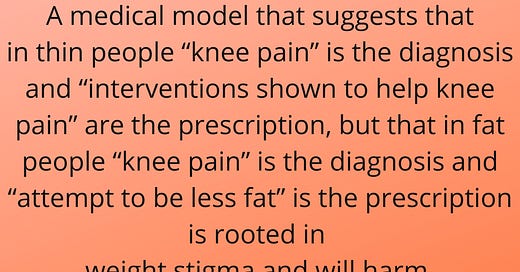This is the Weight and Healthcare newsletter! If you like what you are reading, please consider subscribing and/or sharing!
Joint pain, especially in the knees and hips, is an area of healthcare where fat people face tremendous misinformation and discrimination. Often any joint pain that higher weight patients have gets immediately blamed on their body size, and they are prescribed weight loss as a “cure.” Tragically, these same patients are often barred from ethical, evidence-based treatments by unnecessary BMI/ weight limits.
In part one of this three-part series we’re going to dig into this conceptually, in part two we’ll talk about fat people and arthritis, and in part three we’ll look at the research, weight-neutral options for prevention and treatment of joint pain, and talk about how options to advocate if someone is denied treatment for joint issues due to weight bias.
First of all, people of all sizes get joint pain, so being thin can neither be a sure preventative nor a sure cure. The discussion about fat and joint health is much more complicated than many people would have us believe. And, to be clear, It is also inappropriate to blame or shame anyone for their joint pain for any reason.
As we often talk about, even if someone believes that fat people have worse joint issues, or if we find that treatments are less effective for fat patients, we can’t simply assume it’s body size and then jump to weight loss as a treatment, because we risk making a harmful correlation vs causation error. In this case, as in many cases, weight stigma in healthcare can be a big part of the problem.
If a fat person and a thin person go to the doctor with the same joint pain symptoms, often the fat person will be told to try to lose weight to cure their joint pain, while the thin person will be immediately offered options ranging from medication, to physical therapy, to surgery. That means that the thin person starts addressing the actual problem immediately, while the fat person may be continuing to exacerbate the issue for weeks, months, or more, while trying to manipulate their body size. Then, when they present with more serious knee issues, their body size will be blamed. And if they have exacerbated the issue to the point that they need surgery, they may be denied that surgery because of …wait for it…their weight. So weight stigma in healthcare exacerbates the problem, and then weight stigma in healthcare denies treatment.
To add insult to (actual) injury, often when fat people’s treatment outcomes are compared to thin people’s, the person comparing won’t take into account the fact that fat people are made to wait longer to get treatment, which means that they start off with more advanced issues.
And let’s remember that there’s not a single study that shows that weight loss works long term for more than a tiny fraction of people long term. Frustratingly, even healthcare practitioners who know this will often still prescribe weight loss. Prescribing weight loss to cure joint pain (based on the idea that it almost never works, but it will be great if it does) is roughly the same as prescribing flying because if you jump off your garage and flap your arms really hard you probably won’t fly, but think of the joint pain relief you would feel if it worked and your feet never had to touch the ground!
A medical model that suggests that in thin people “knee pain” is the diagnosis and “interventions shown to help knee pain” are the prescription, but that in fat people “knee pain” is the diagnosis and “attempt to be less fat” is the prescription is rooted in weight stigma and will harm fat patients.
A weight loss prescription is also medically unethical without informed consent – which requires a healthcare professional to explain clearly that intentional weight loss attempts are almost never successful long-term and often result in weight gain. (Meaning that if the healthcare practitioner believes that body size is the problem, they are giving a prescription that results in a larger body up to about 66% of the time.)
So if you are dealing with joint pain and you’re being told that weight loss is the only thing that can help, you are absolutely, positively, one hundred percent being lied to.
In part 2 we’ll talk about the options and evidence around weight-neutral joint care, including what you can do if you are being denied care due to weight stigma.
In the mean time, did you find this post helpful? You can subscribe for free to get future posts delivered direct to your inbox, or choose a paid subscription to support the newsletter and get special benefits! Click the Subscribe button below for details:
More research and resources:
https://haeshealthsheets.com/resources/
*Note on language: I use “fat” as a neutral descriptor as used by the fat activist community, I use “ob*se” and “overw*ight” to acknowledge that these are terms that were created to medicalize and pathologize fat bodies, with roots in racism and specifically anti-Blackness. Please read Sabrina Strings Fearing the Black Body – the Racial Origins of Fat Phobia and Da’Shaun Harrison Belly of the Beast: The Politics of Anti-Fatness as Anti-Blackness for more on this.




This is absolutely what has happened to me with 2 orthopaedic surgeons. I luckily persevered and found a surgeon who was not weight biased and operated on my knee that had a bucket handle tear, I was on crutches for 5 months due to the injury, one I sustained on a bike ride, something I do at least 3 times a week. The other surgeons refused to see my good health and exercise habits, one even sent me to a bariatric surgeon... I was horrified!
I'm Still recovering and have difficulty straightening my knee because treatment was delayed for so long!
Thankyou for this article